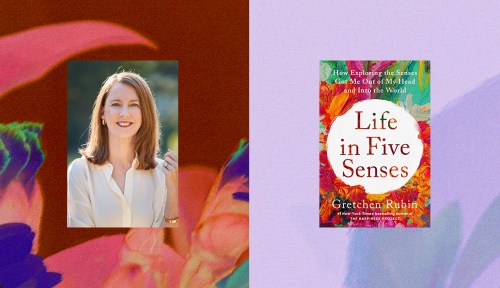Our editors independently select these products. Making a purchase through our links may earn Well+Good a commission
Happiness researcher Gretchen Rubin tells me she is “prone to epiphanies.” That feels fitting, given it was an epiphany over a decade ago that inspired her to spend a year test-driving every happiness practice she could find and documenting it in what would become the New York Times bestseller, The Happiness Project. The moment that inspired that project happened on a New York City bus—a flash of realization that her life was speeding by, and she wasn’t savoring the important parts. Recently, she had another epiphany in just as unlikely of a spot: her eye doctor’s office. A comment from her doctor about the potential that she might lose her vision made her realize that she had been taking her five senses for granted.
Experts in This Article
happiness expert and New York Times bestselling author of The Happiness Project
Rubin’s doctor told her that day that her extreme nearsightedness puts her at high risk for a detached retina, which can cause vision loss. While she knew, intellectually, that she could lose her vision (or any sense) at any point, the gravity of that hadn’t really hit her—until her doctor mentioned it explicitly. “I suddenly thought, ‘My sight is so precious to me, and yet, I don’t pay any attention to it. I don’t appreciate it. I didn’t notice a single thing on my way [to the doctor’s office],’” she says.
“I suddenly thought, ‘My sight is so precious to me, and yet, I don’t pay any attention to it. I don’t appreciate it.’” —Gretchen Rubin, happiness expert
On her walk home through the streets of New York City, everything seemed to pop in Technicolor, tickling all her senses in a way she’d never before experienced—just because she decided to pay attention. The buildings appeared rife with architectural details, the car horns and birdsong danced in her eardrums, and the panoply of smells (again, this is New York City) seemed as pungent as a parfumerie.
Since the big epiphany that led her to become a happiness researcher, Rubin has certainly experienced plenty of others surrounding, say, the impact of your environment on your happiness and the joy-sparking power of small habits. But here was yet another: The five senses (or however many are accessible to you) can be a tool for experiencing more joy and presence in your daily life. Putting that notion to the test would become the subject of her most recent book, Life in Five Senses: How Exploring the Senses Got Me Out of My Head and Into the World, released April 18.
Why neglecting any of the five senses can hold you back from happiness
Though Rubin had been studying happiness for years prior to that fateful walk home from the eye doctor, she’d been feeling for some time that there was a key element she was overlooking.
“I felt like I’d gotten stuck in my head and was sort of out of touch,” she says. In the book, she describes the feeling as a “chronic fog of preoccupation”—the kind that long allowed her to walk right by a beautiful sunset without so much as noticing it because she was “too busy rewriting a paragraph in her head,” she tells me. Or, to tune out an entire audiobook because she was preoccupied with thinking about the items on her to-do list.
Rubin’s hyper-focus on efficiency had detached her from the sensations of her life and what she calls “the quick hits of exuberance” that her five senses could provide. Neglecting her senses had left her stuck in her head, unable to really feel and experience things in her body, and struggling to be present or appreciate the moment.
In particular, Rubin found that she had especially been neglecting her sense of taste. “I could see from observing other people’s enjoyment and appreciation of different cuisines that this was something I was really not tuned into,” she says. Whereas others might naturally like to explore new restaurants or cook new dishes or even watch TV shows and movies about cooking, Rubin never had any interest in any of that. “I’m in three book clubs and I like to host them at my place, but I’ve always wished I could just skip the dinner portion,” she says.
While foodies may be cringing at these sentiments, it’s common for people to neglect at least one of their five senses on a regular basis, says Rubin. That’s why she created a “Neglected Sense” quiz to help people identify which sense they may be disregarding and how that might be limiting their experience of their own life, and therefore, their happiness.
“With a neglected sense, you don’t try to learn about it, you don’t want to talk about it, and you don’t seek out new experiences surrounding it,” says Rubin. That lack of engagement can then reinforce a negative cycle: If you aren’t really noticing a particular sense (say, taste or hearing), you also won’t realize what you’re missing, which can just keep you from engaging, further restricting your ability to enjoy the sensations of that particular sense.
How embracing your senses can help you experience more joy and mindfulness
At a broad level, tapping into the five senses is a way to notice the everyday joy-sparking elements of life—a sweet-smelling bakery, a warm and fluffy puppy—that might otherwise just pass you by. “The five senses are a concrete way to get back into direct contact with your body and your life,” says Rubin.
Though that might just look like tuning into a particular sense in your day-to-day life, you can also engage in activities that especially activate one or more of them, like, for instance, going to a museum to stimulate your sense of sight, heading to a sandy beach to dial into touch, or simply savoring a meal more intently in order to really tap into taste.
“Once you’re actually aware of your senses, you’ll also realize that you can take steps to make your environment more inviting.” —Rubin
Because Rubin had found that her engagement with taste was especially minimal, she decided to design an activity geared even more explicitly around it: a taste party. Different from a typical dinner party, the taste party consisted of tasting a bunch of different varieties of apples, potato chips, and other foods side-by-side with friends (without having any information on what they were) and sharing realtime thoughts and reactions.
“It’s the kind of thing you don’t typically do as part of everyday life, so it sparks a ton of different opinions and conversations,” says Rubin. As for how the party influenced her experience of taste? It was a fascinating exercise on how your awareness of a sense can change when you pay attention, she says.
Case in point: her newfound appreciation for ketchup. “When you really focus on the flavor of ketchup, it’s bonkers how complex it is,” she says. In fact, after one of her friends tasted ketchup at the taste party (without knowing what it was), she told Rubin she thought it was “some incredibly sophisticated dip.”
That’s the power of embracing the senses directly as a route toward more mindfulness and, in turn, more happiness, too. “I just get so much more pleasure out of [eating] now, and I don’t take my sense of taste for granted,” says Rubin.
Paying closer attention to the five senses can also teach you a lot about yourself and the different sensory inputs you like (and don’t like), which can help you better shape your environment to suit yourself, says Rubin. For instance, you might find by tapping into your sense of sound, that you enjoy the hum of a coffee shop or particular types of background music, or that you despise the sound of certain notifications or beeps created by household items. “A lot of times, we just put up with those unpleasant things, or we don’t take action to change our environments to suit our senses,” says Rubin. “But once you’re actually aware of your senses, you’ll also realize that you can take steps to make your environment more inviting.”
“Our senses are this vital aspect of our existence that are also strangely easy to ignore.” —Rubin
In a similar way, embracing the five senses can also help you connect more deeply with other people—which is its own generator of happiness. Rubin’s taste party, for example, sparked connection points around whether people thought the different food items tasted good or bad, reminded them of a certain memory, or otherwise elicited a reaction. But Rubin contends that any sensory experience can create the glue that bonds people together.
Sharing a meal or a drink or visiting a museum are perhaps classic examples of activities meant to activate different senses and that, in turn, create room for positive connection. That’s one of the reasons why Rubin suspects we’ve seen an influx of “immersive” exhibits and activations as of late: “Having a unique sensory experience is a cool thing to share with other people.”
Immersive exhibits, like the traveling Immersive Van Gogh, are also designed to remove the typical distractions to our senses by making a sensory experience the whole point. And that’s what Rubin thinks we all need a little more of in our lives. “Our senses are this vital aspect of our existence that are also strangely easy to ignore,” she says. “But by tapping into them, I really think we can make our lives deeper and richer in so many ways.”
Sign Up for Our Daily Newsletter
Get all the latest in wellness, trends, food, fitness, beauty, and more delivered right to your inbox.
Got it, you've been added to our email list.











